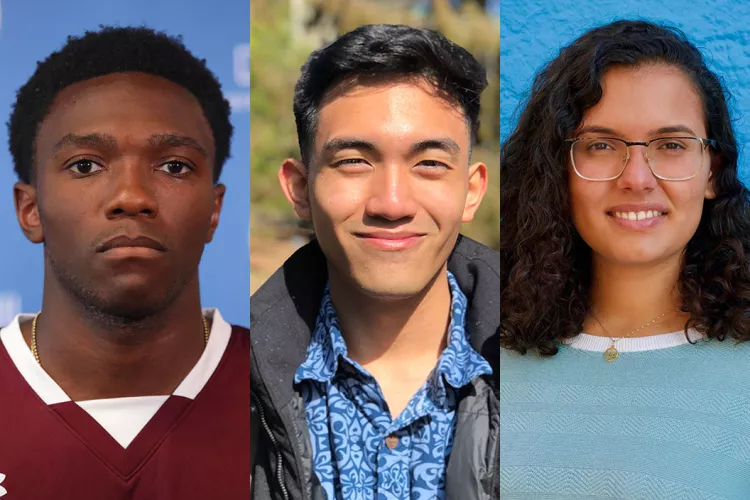Personal Stories of Immigration Shared on Course Website

Ayodeji George ’22 (left) and Daniel Torres Balauro ’23 (middle) collected immigrant narratives for the Borders and Migration seminar while Lamia Makkar ’21 helped develop the course website.
Their narratives are as diverse as the countries they came from, detailing the struggles and successes of life as an immigrant in the United States. During the seminar Borders and Migration, Ayodeji George ’22 began writing about the life of his father, Olakunle, an immigrant from Nigeria. When he finished, had a new perspective on his family’s history.
“He made the decision to come to the U.S. when he was 25, only a few years older than I am now,” says George, a political science major from Cranston, R.I. “This age similarity and the fact that many of his experiences in graduate school mirrored mine at Swarthmore allowed me to see my dad in a different way than when I was younger.”
Olakunle’s journey is one of 19 featured on Migration Stories, a collection of oral histories documenting the experiences of immigrants living in the United States. Created by students as a capstone project for Borders and Migration, the website aims to put a human face on the issue of immigration, says Visiting Assistant Professor of Political Science Osman Balkan, the course’s instructor. For the project, students were asked to interview someone living in the United States who had been born in another country, the basic definition of an immigrant as used by the U.N. International Organization for Migration.
“There are a lot of negative stereotypes about immigrants — they’re taking our jobs, they’re ruining the country, they’re bringing all these foreign ideas and ways of life — but the ‘good immigrant’ trope comes with its own baggage: the idea that one ought to be judged on the basis of their economic contributions,” says Balkan, an ethnographer who focuses on borders, race, ethnicity, and related subjects. “What the stories help to do is complexify these binary narratives of the good and bad immigrant, to highlight the hardships and the challenges, but also the successes and achievements and all the tricky decisions that had to be made along the way, showing the complexity of that human experience.”
Developed five years ago, Borders and Migration explores the politics of global immigration by tackling three main questions: Why do people move from one place to another? How do governments try to manage that mobility? And how do countries accommodate newcomers to their territory, or fail to do so?
With its emphasis on racial identity, multiculturalism, and debates around national identity and diversity, the course was one of four supported by the President’s Fund for Racial Justice. The seminar also received funding through an Engaged Scholarship Teaching Grant from the Lang Center for Civic and Social Responsibility, and next spring’s session will be taught as part of the immersive Tri-Co Philly program.
Daniel Torres Balauro ’23 chose to interview “Irma” after reading her work on women’s migration and globalization. Now a professor in the U.S., the Filipino-born Irma had been a migrant worker in Hong Kong, where she faced limited opportunities and low pay.
“For Irma, the subject of migration is nothing new, but one deeply rooted in personal and intergenerational experience,” says Torres Balauro, an environmental governance and policy special major from Pago Pago, American Samoa. Balkan’s course made clear the importance of sharing narratives like hers, he adds, because “stories of migrants are often surrounded with political rhetoric that unfairly denigrates their backgrounds and identities.”
Balkan plans to build on the Migration Stories site to showcase students’ qualitative research and continue the conversation surrounding immigration. He hopes the site and the course will help students connect the dots between individual stories and the larger processes that influence the movement of people.
That was the primary takeaway for Andrea Toledo Cortes ’22, an economics and psychology major from Hillsborough, N.C. Before the course, she says, she had sought to justify her family’s migration to the U.S. from Mexico when she was a child. However, “taking this class taught me that I don’t need to find that justification,” she says. “Why are we politicizing and militarizing the movement of people? We discussed this question a lot in this course, but it is kind of frustrating that we even have to ask it in the first place.”
Although an interview project has always served as the capstone for Borders and Migration, this spring’s session was the first to have the narratives compiled into a public-facing website. Balkan worked with former student Lamia Makkar ’21 to develop the site, which features the immigrants’ stories and photos aggregated by the class.
“One of the reasons that I got so engaged with Professor Balkan’s classes and independent projects is because of his emphasis on nontraditional stories and experiences, with a large focus on international case studies,” says Makkar, who says she declared sociology & anthropology as her major (along with computer science) in large part because of her interview project. “For me, working on the Borders and Migration website was a testament to my favorite parts of academics at Swarthmore: that we have the space and opportunity to pursue multiple academic trajectories and find ways where all of these mixed interests can come together.”



